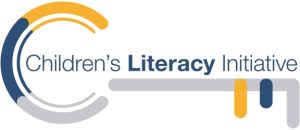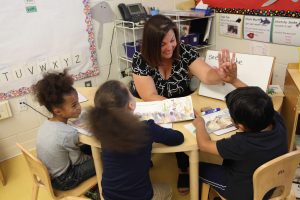Children’s Literacy Initiative (CLI) , headquartered in Philadelphia, PA, empowers schools and communities to transform instruction so children thrive and become powerful readers, writers, and thinkers. Through research-based professional learning, job-embedded coaching, and leadership development, CLI equips educators and communities with the tools and strategies to accelerate literacy outcomes and ensure that all children can succeed.
Vision
At Children’s Literacy Initiative (CLI), we believe literacy is a gateway to opportunity, self-expression, and equity; and we are committed to creating a world where every child has access to high-quality, culturally sustaining literacy instruction. We equip teachers with research-based strategies, foster dynamic learning communities, and collaborate with districts for continuous improvement so that children can build strong foundations as readers, writers, and thinkers. Our goal is to ensure every child achieves reading proficiency, shaping brighter futures by equipping children with strong reading and writing skills, the foundation for all future learning, while grounding in reading joy and positive identity development. As children build reading proficiency, they gain the confidence and critical thinking skills needed to access grade-level content, engage fully in school, and ultimately create their own paths toward success.

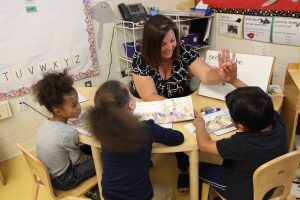
History
Founded in 1988, CLI has spent over 37 years partnering with educators, schools, and districts nationwide to transform literacy instruction from Birth through Grade 8. What began as a grassroots effort to provide classroom teachers with evidence-based instructional tools and quality literature, has evolved into a comprehensive, systemic approach that includes:
-
- Professional Learning & Coaching: Intensive, job-embedded support for educators to strengthen instructional practice.
- Leadership Development: Partnering with school and district leaders to build capacity and sustain change.
- Frameworks for Impact: Our Core Service Model, Framework for Teaching & Learning, Early Childhood Framework, and Family Engagement Framework guide educators in creating inclusive, responsive, and effective literacy environments.
CLI’s work now spans over a dozen states, including major initiatives in Florida, Pennsylvania, Massachusetts, Illinois, New Jersey and California, serving thousands of educators and tens of thousands of children.
Activities
Through our integrated model, CLI supports educators, leaders, and families by:
- Facilitating research-based professional development workshops that are delivered both in-person and virtually (live video, interactive breakout rooms, and asynchronous modules). These workshops focus on the science of reading, culturally sustaining practices, and differentiated literacy instruction. Teachers can engage in modeled lessons where they practice read-aloud strategies, plan small-group instruction, and analyze student work to strengthen their ability to meet the needs of every child.
- Providing job-embedded coaching where CLI coaches work side-by-side with educators in classrooms. Coaches observe lessons, co-teach, and provide immediate feedback to help teachers refine instructional practices in real time. CLI coaches may help a kindergarten teacher adjust a phonics lesson on the spot to support multilingual learners or guide a grade 3 teacher in facilitating a deeper discussion of a shared text.
- Supporting leaders through individualized coaching and collaborative planning. CLI meets directly with center directors, principals, and district leaders to review existing instructional practices, analyze data, and co-create actionable improvement plans. Leaders receive tools to monitor progress, conduct learning walks, and adjust strategies as needed. Together with CLI support, a leadership team may revise their school-wide literacy block structure after analyzing child outcomes or examine how teachers are utilizing child data in their Professional Learning Communities (PLCs).
- Developing and sharing instructional frameworks, tools, and resources to guide high-quality practice. These are provided directly to participants during trainings and coaching sessions, and many are also freely available on CLI’s website. For example, CLI’s Framework for Teaching & Learning outlines key domains, from relationships and community to literacy and language development, that help educators design effective and equitable classrooms. CLI’s Frameworks assist in creating the vision of equitable instruction and they also become a common language used by the entire learning community.
- Engaging families and communities as critical partners by providing literacy workshops, take-home book packs, and family engagement toolkits. Families are supported to create joyful literacy routines at home, such as shared read-alouds, storytelling, and book discussions, that mirror classroom practices. CLI has facilitated “Family Literacy Nights” where parents practice interactive reading strategies with their children and receive books and resources to continue at home.
Behind every data point is a story of transformation—teachers finding their footing, students discovering their voices, and families witnessing new possibilities. Take Ms. Lozada, a long-term substitute stepping into a first-grade classroom without resources or training. CLI coaches worked alongside her to build routines, introduce culturally relevant texts, and tailor strategies to meet every child’s needs. By year’s end, 90% of her 30 students advanced their reading levels — and only one remained an emergent reader.
These are not just test scores. They are children gaining voice and confidence, teachers stepping into their power, and families watching doors open for their children’s futures — all with the help of CLI.
When David, a multilingual learner, entered sixth grade, his English Language Development (ELD) level was just a “2.” He sat quietly in class, hesitant to participate and ashamed to be so far behind in English. His teacher cared deeply but, like so many, lacked the resources and targeted strategies to help him grow. Then CLI stepped in. Through job-embedded coaching, research-based tools, and targeted strategies, we partnered with David’s teacher to build interventions that met him where he was, built on his strengths, and fostered his confidence. By the end of the year, David’s ELD level had soared from “2” to “12”. David’s story is not unique — it’s what happens when teachers are empowered, families are engaged, and classrooms are transformed. It’s what CLI makes possible every day.
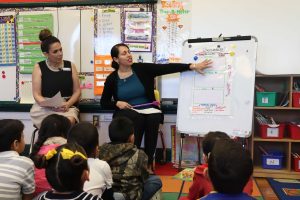
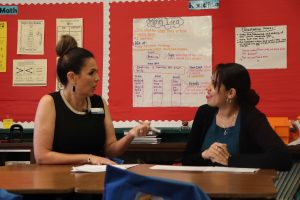
Audiences Served
-
-
- Educators: Teachers, coaches, and specialists supporting Birth to Grade 8 literacy instruction.
- School & District Leaders: Principals, superintendents, and instructional leadership teams working to align goals and sustain impact.
- Families & Communities: Empowering families to support literacy at home and fostering inclusive school communities.
- Children: Ultimately, our work impacts thousands of children, ensuring equitable access to high-quality literacy instruction.
-
Process & Participation
Children’s Literacy Initiative (CLI) customizes every partnership to meet the unique needs of schools, districts, and communities. Services are completely flexible — whether supporting an entire system, an individual school, a single grade level, or even piloting in one or two classrooms before scaling.
-
- Partnership Models
-
- System-wide partnerships: Collaborating with entire districts to align vision, build leadership capacity, and strengthen instruction across all schools.
- Single school partnerships: Providing targeted support for school leadership teams, educators, and families.
- Grade-level or classroom partnerships: Supporting specific grade bands (e.g., K–2 foundational skills or Grades 2–3 literacy acceleration) or piloting work in a small number of classrooms before expansion.
-
- Professional Learning Offerings
-
- Professional Development Workshops: Prices vary based on number of participants, virtual or onsite, and the content needed. The average cost of a full day onsite PD for 30 people is $7,600, while a half day virtual training is $3,400.
- On-site support: Full-day coaching days average $1,500 per day.
- Virtual support: Planning sessions or coaching hours are available at $250 per hour.
- Services can include one-time professional development workshops, multi-session learning series, job-embedded coaching cycles, and leadership coaching.
- Duration of Partnerships
- Pilot Projects: Many partners begin with a 6–12 month pilot to introduce coaching and professional development.
- Multi-year Contracts: Others engage in 2–3 year system-level partnerships to support sustainable improvement, leadership capacity-building, and long-term impact.
-
- Customization in Action
-
- In Philadelphia, CLI partnered with the district to establish model classrooms and scale effective practices district-wide.
- In Florida, CLI worked with early learning providers to deliver targeted coaching to pre-K classrooms, improving readiness outcomes.
- In Massachusetts, CLI supported 25 early education programs with leadership coaching, tailored professional learning, and educator development.
-
- Partnership Models
Through this adaptable process, CLI ensures that every partnership, no matter the size, is grounded in evidence-based literacy practices, responsive to community needs, and designed for sustainable results
Successful Impact
CLI’s impact is grounded in rigorous research and real-world results:
-
- In a three-year, randomized control study of CLI’s i3 project across four cities, CLI-supported teachers significantly outperformed peers, and 11% more students reached district reading benchmarks compared to children in comparison schools.
- In Philadelphia, CLI’s Model Classroom Project demonstrated a ripple effect, empowering teachers to become leaders and driving gains across entire schools.
- In Florida’s VPK programs, CLI’s coaching and professional development have improved teacher-child interactions measured by CLASS scores and increased early literacy readiness as measured by FAST outcomes.
- Across Massachusetts, CLI’s work in the Early Childhood Support Organization (ECSO) initiative has strengthened organizational leadership, enhanced instructional quality, and improved child outcomes in early learning programs statewide.
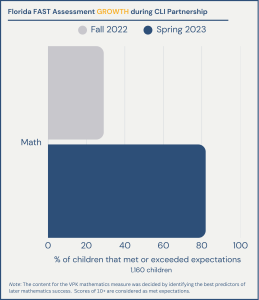
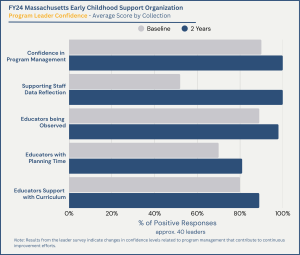
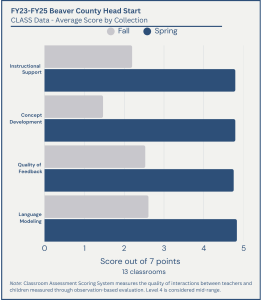
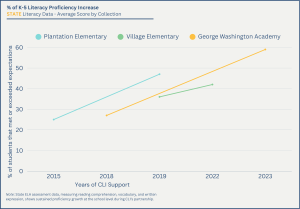
Recommendations for Replication and Adaptation
CLI’s model is intentionally designed to be adaptable and replicable across diverse educational contexts — from large urban districts to small community-based early childhood centers. While most of our intensive professional development and coaching services are provided through formal partnerships, we also make many resources freely accessible so that educators everywhere can benefit.
Key elements include:
- Framework-Based Approach
Professional learning is anchored in clear, research-based frameworks that guide practice. For example, the Framework for Teaching & Learning outlines domains — including environment, relationships and community, and literacy and language development — that help educators design inclusive classrooms. Similarly, the Family Engagement Framework equips schools to build authentic partnerships with families. - Job-Embedded Coaching
CLI partners with educators and leaders in multiple formats — one-on-one coaching sessions, small-group professional learning communities (PLCs), and collaborative planning meetings. Coaching always includes a feedback loop: coaches observe instruction, provide real-time suggestions, co-plan with the educator, and return for follow-up support to ensure strategies are implemented with fidelity. - Culturally Sustaining Instruction
CLI helps educators honor children’s identities, languages, and lived experiences by selecting texts and designing lessons that reflect and expand students’ cultural backgrounds. For example, a read-aloud in a bilingual classroom might feature an author writing in both English and Spanish, while a middle-grade classroom might analyze literature that reflects racial and gender diversity. Teachers are also supported to use storytelling, home languages, and community histories as springboards for literacy learning. - Open-Access Resources
Beyond contracted services, CLI provides free materials such as resource guides, booklists, and videos through our various platforms. These resources are available to any educator, school, or family seeking practical strategies to support children’s reading and writing development.
Schools, districts, and early childhood centers can replicate CLI’s model by combining professional development, job-embedded coaching, leadership support, and open-access tools. The approach is intentionally flexible, allowing each partner to scale services over time while building local capacity to sustain high-quality literacy instruction.
https://vimeo.com/1086863444?share=copy
https://vimeo.com/929648522/c08e1a186d?share=copy
Contact Information
Website: https://cli.org
Primary Contact: Michele LaCoursiere-Ferrer
Title: Managing Director of Strategic Partnerships
Email: mlacoursiere@cli.org

